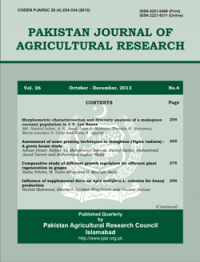INTERACTION OF HERBICIDES AND BIO-INOCULANTS WITH AGRICULTURAL CROPS AND WEEDS
Shahida Khalid*and Shahida Nasreen Khokhar*
ABSTRACT
Bioinoculants contribute to soil environment through their versatile role. Whereas weeds are a limitation and herbicide carryover can also be injurious to subsequent crops. The residual/carryover herbicides may influence sowing decisions for the next crop due to reduced herbicide breakdown. The present study aimed at exploring the contribution of bio-fertilizer microbes (Azospirillum) to mitigate the inhibitory effect of herbicide residue in soil, and their inhibitory effect on weed seeds. The crops studied under laboratory conditions were Brassica spp. and Zea mays while Phalaris minor was the test weed. In first experiment, Brassica and maize, grown in soils having residues of either Triasulfuron+Terbutryn (Logran) or Sulfosulfuron (Leader), were found to significantly mitigate (% increase in root length, shoot length, fresh weight and dry weight) the inhibitory effect of residues , when inoculated with Azospirillum A4. In second experiment two Azospirillum (B2 and B3) and two Azorhizobium (3.6ksk and srsn2k4) isolates reduced seed germination of Phalaris minor by 95%. The results imply that biofertilizer microbes can mitigate the carryover effect of the two sulfonylureas; they can also inhibit Phalaris minor. Therefore, the use of bio-inoculants, weed seed germination and residual effect of weedicide can be manipulated for the betterment of the crops and these microbes can be used for a positive interaction of maintaining a threshold of weeds in a crop field.
To share on other social networks, click on any share button. What are these?






